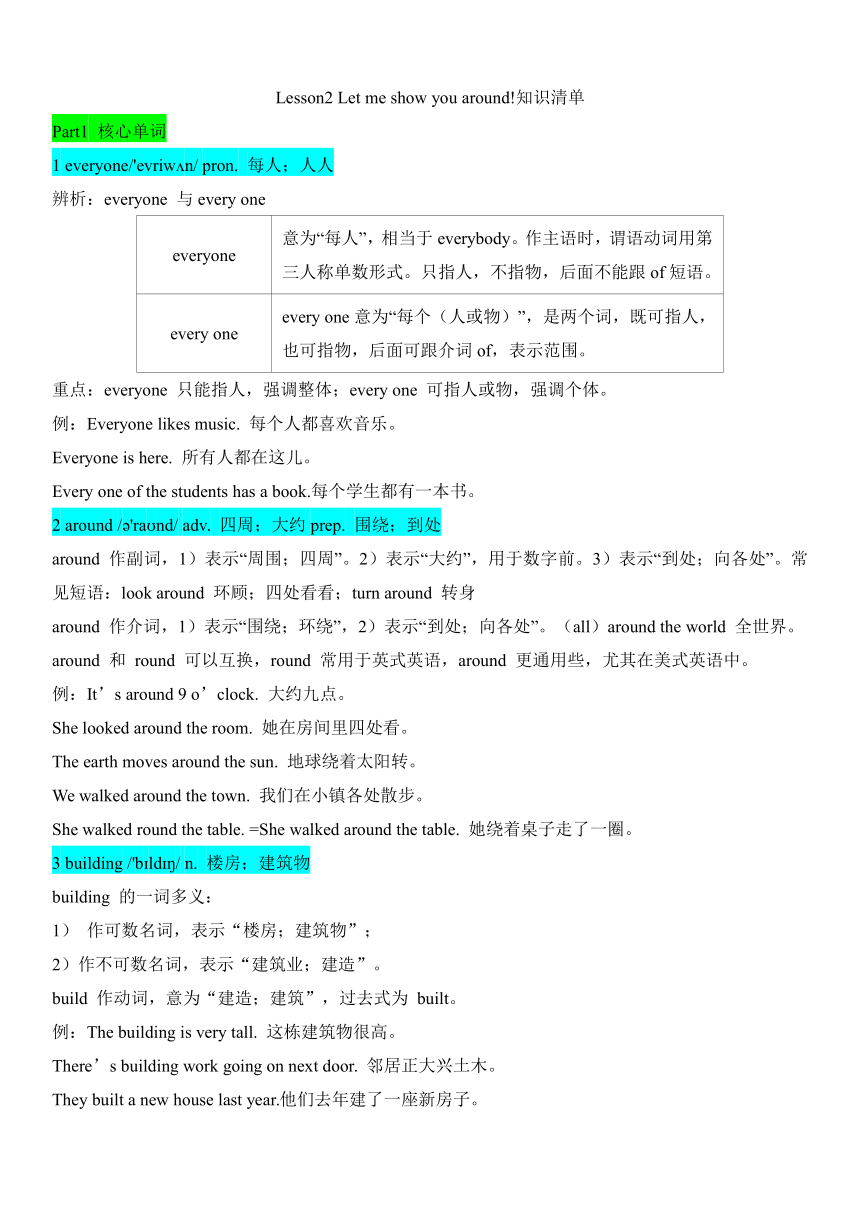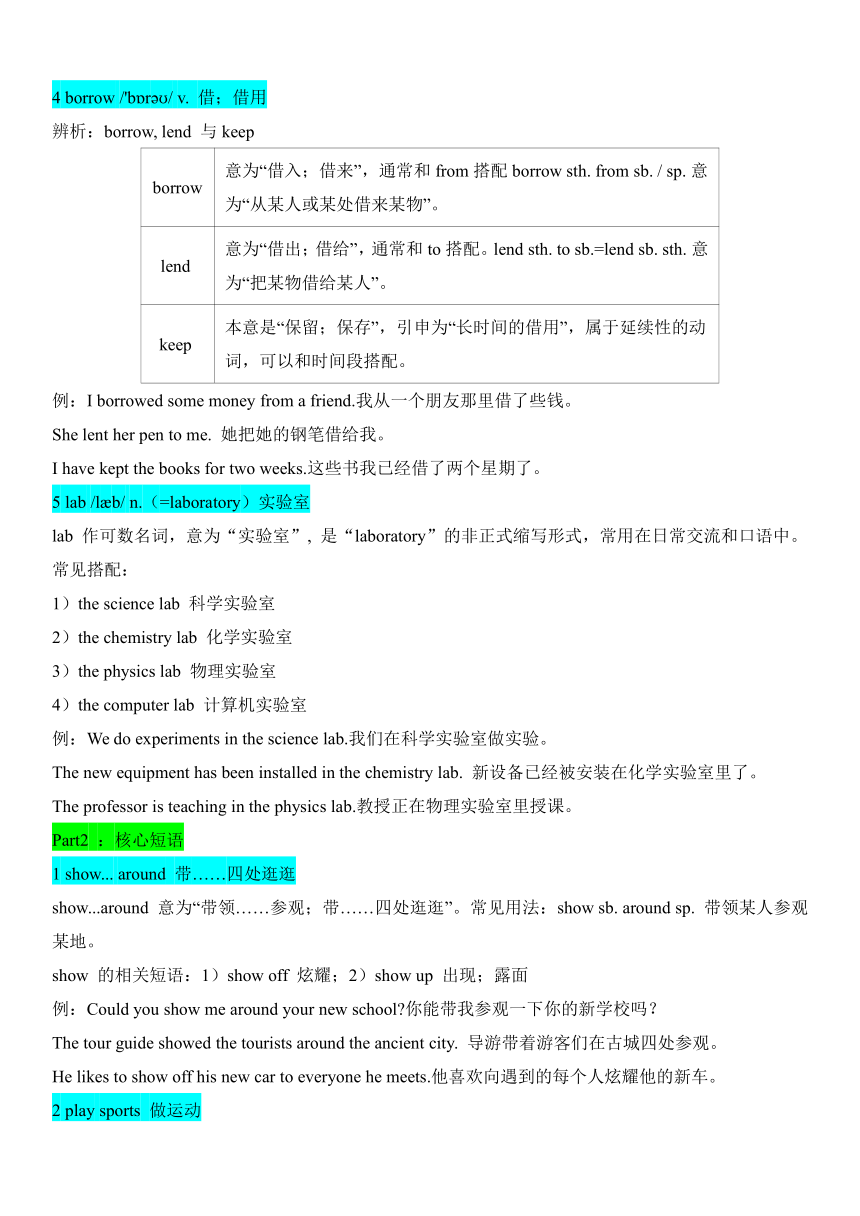Unit 1 Lesson 2 Let me show you around! 知识清单 2025-2026学年冀教版(2024)七年级英语上册
文档属性
| 名称 | Unit 1 Lesson 2 Let me show you around! 知识清单 2025-2026学年冀教版(2024)七年级英语上册 |  | |
| 格式 | docx | ||
| 文件大小 | 22.2KB | ||
| 资源类型 | 教案 | ||
| 版本资源 | 冀教版 | ||
| 科目 | 英语 | ||
| 更新时间 | 2025-07-07 12:10:29 | ||
图片预览


文档简介
Lesson2 Let me show you around!知识清单
Part1 核心单词
1 everyone/'evriw n/ pron. 每人;人人
辨析:everyone 与every one
everyone 意为“每人”,相当于everybody。作主语时,谓语动词用第三人称单数形式。只指人,不指物,后面不能跟 of 短语。
every one every one 意为“每个(人或物)”,是两个词,既可指人,也可指物,后面可跟介词of,表示范围。
重点:everyone 只能指人,强调整体;every one 可指人或物,强调个体。
例:Everyone likes music. 每个人都喜欢音乐。
Everyone is here. 所有人都在这儿。
Every one of the students has a book.每个学生都有一本书。
2 around / 'ra nd/ adv. 四周;大约prep. 围绕;到处
around 作副词,1)表示“周围;四周”。2)表示“大约”,用于数字前。3)表示“到处;向各处”。常见短语:look around 环顾;四处看看;turn around 转身
around 作介词,1)表示“围绕;环绕”,2)表示“到处;向各处”。(all)around the world 全世界。
around 和 round 可以互换,round 常用于英式英语,around 更通用些,尤其在美式英语中。
例:It’s around 9 o’clock. 大约九点。
She looked around the room. 她在房间里四处看。
The earth moves around the sun. 地球绕着太阳转。
We walked around the town. 我们在小镇各处散步。
She walked round the table. =She walked around the table. 她绕着桌子走了一圈。
3 building /'b ld / n. 楼房;建筑物
building 的一词多义:
1) 作可数名词,表示“楼房;建筑物”;
2)作不可数名词,表示“建筑业;建造”。
build 作动词,意为“建造;建筑”,过去式为 built。
例:The building is very tall. 这栋建筑物很高。
There’s building work going on next door. 邻居正大兴土木。
They built a new house last year.他们去年建了一座新房子。
4 borrow /'b r / v. 借;借用
辨析:borrow, lend 与keep
borrow 意为“借入;借来”,通常和from 搭配borrow sth. from sb. / sp. 意为“从某人或某处借来某物”。
lend 意为“借出;借给”,通常和to 搭配。lend sth. to sb.=lend sb. sth. 意为“把某物借给某人”。
keep 本意是“保留;保存”,引申为“长时间的借用”,属于延续性的动词,可以和时间段搭配。
例:I borrowed some money from a friend.我从一个朋友那里借了些钱。
She lent her pen to me. 她把她的钢笔借给我。
I have kept the books for two weeks.这些书我已经借了两个星期了。
5 lab /l b/ n.(=laboratory)实验室
lab 作可数名词,意为“实验室”, 是“laboratory”的非正式缩写形式,常用在日常交流和口语中。
常见搭配:
1)the science lab 科学实验室
2)the chemistry lab 化学实验室
3)the physics lab 物理实验室
4)the computer lab 计算机实验室
例:We do experiments in the science lab.我们在科学实验室做实验。
The new equipment has been installed in the chemistry lab. 新设备已经被安装在化学实验室里了。
The professor is teaching in the physics lab.教授正在物理实验室里授课。
Part2 :核心短语
1 show... around 带……四处逛逛
show...around 意为“带领……参观;带……四处逛逛”。常见用法:show sb. around sp. 带领某人参观某地。
show 的相关短语:1)show off 炫耀;2)show up 出现;露面
例:Could you show me around your new school 你能带我参观一下你的新学校吗?
The tour guide showed the tourists around the ancient city. 导游带着游客们在古城四处参观。
He likes to show off his new car to everyone he meets.他喜欢向遇到的每个人炫耀他的新车。
2 play sports 做运动
play sports 表示“做运动;进行体育活动”,sports 泛指各类体育运动,可用于描述体育锻炼这一行为。
同义短语:“do sports” “have sports”在很多情况下可以与play sports 互换。
“play + 具体运动项目”表示“做某项运动”。play football踢足球;play basketball 打篮球。
例:We play sports together every weekend.我们每周末都一起做运动。
You should do sports to keep fit.你应该做运动来保持健康。
3 in front of 在……前面
辨析:in front of 与in the front of
in front of “在……前面”,表示在物体外部的前面。反义词为behind“在……后面”。
in the front of “在……前面”,表示在物体内部的前面。反义短语为at the back of“在……后面”。
例: The boy is standing in front of the blackboard.男孩站在黑板前面。
There is a teacher’s desk in the front of the classroom.教室的前部有一张讲台。
The dog is behind the tree. 狗在树的后面。
Our room was at the back of the hotel.我们的房间在旅馆靠后面的地方。
4 look like 看起来像
look like 意为“看起来像”, 侧重外在特征,外貌,外观。be like“像;像……一样”,侧重内在特征,品质,特性等。
What does sb. /sth. look like ”常用来询问某人或某物的外貌特征。
与 look 相关的短语:look after 照顾;照料;look forward to 盼望;look over 检查;look back 回顾;look out 当心;look through 浏览;look for 寻找;look at 看
例:He looks like his father. 他长得像他父亲。
He is like his father. They have the same sense of humour. 他像他的父亲。他们有着同样的幽默感。
What does your new teacher look like 你的新老师长什么样?
I often look after my little brother when my parents are busy. 当父母忙的时候,我经常照顾我的弟弟。
Part3 核心句式
1 Now, let me show you around. 现在,让我带你们四处逛逛。
1)分析结构 这是一个祈使句,其中let 是使役动词,其前省略了主语you,me 作let 的宾语,show you around 作宾语补足语,you 是show 的宾语,around 是副词作状语。整个句子表示请求或建议:(你们)让我带领你们四处逛逛。
2)“Let sb.(名词或代词宾格) + do(动词原形)sth.”. 表示“让某人做某事”,是一个常用句式。
“Don’t let sb. do sth.”表示“不要让某人做某事”,是比较常用的否定形式。“Let sb. not do sth.”这种结构在口语中相对少用一些,但也是正确的表达方式。
例:Let me show you around our factory. 让我带你参观一下我们的工厂。
Don’t let the children play with fire.不要让孩子们玩火。
Let’s not waste time. 咱们别浪费时间。
2 This is our lab building. 这是我们的实验室大楼。
1)分析结构 此句为简单的主系表结构。This 作主语,指代特定的事物。is 为系动词,起连接作用。our lab building 是表语,说明主语是什么,our 是物主代词修饰lab building。
2)This is... 用于介绍离说话人较近的事物。
That is... 用于介绍离说话人较远的事物。
These are... 用于介绍离说话人较近的多个事物。
Those are... 用于介绍离说话人较远的多个事物。
例:This is a chair for the living room.这是客厅的一把椅子。
That is a famous museum in the city.那是城市里一座著名的博物馆。
These are my friends from school.这些是我学校的朋友。
Those are stars in the far sky.那些是遥远天空中的星星。
3 We have our science lessons here. 我们在这里上科学课。
1)分析结构 此句为简单句。We 是主语,指执行动作的主体“我们”。have 是谓语动词,意为“进行;上(课)”。our science lessons 是宾语,our 为形容词性物主代词修饰science lessons。here 是地点状语,表明动作发生的地点。
2)“We have+ 课程/ 活动+ 地点状语.”,用于描述在某地开展某种活动或课程。
例:We have our English classes in this room.我们在这个房间上英语课。
They have their meetings there.他们在那儿开会。
Part1 核心单词
1 everyone/'evriw n/ pron. 每人;人人
辨析:everyone 与every one
everyone 意为“每人”,相当于everybody。作主语时,谓语动词用第三人称单数形式。只指人,不指物,后面不能跟 of 短语。
every one every one 意为“每个(人或物)”,是两个词,既可指人,也可指物,后面可跟介词of,表示范围。
重点:everyone 只能指人,强调整体;every one 可指人或物,强调个体。
例:Everyone likes music. 每个人都喜欢音乐。
Everyone is here. 所有人都在这儿。
Every one of the students has a book.每个学生都有一本书。
2 around / 'ra nd/ adv. 四周;大约prep. 围绕;到处
around 作副词,1)表示“周围;四周”。2)表示“大约”,用于数字前。3)表示“到处;向各处”。常见短语:look around 环顾;四处看看;turn around 转身
around 作介词,1)表示“围绕;环绕”,2)表示“到处;向各处”。(all)around the world 全世界。
around 和 round 可以互换,round 常用于英式英语,around 更通用些,尤其在美式英语中。
例:It’s around 9 o’clock. 大约九点。
She looked around the room. 她在房间里四处看。
The earth moves around the sun. 地球绕着太阳转。
We walked around the town. 我们在小镇各处散步。
She walked round the table. =She walked around the table. 她绕着桌子走了一圈。
3 building /'b ld / n. 楼房;建筑物
building 的一词多义:
1) 作可数名词,表示“楼房;建筑物”;
2)作不可数名词,表示“建筑业;建造”。
build 作动词,意为“建造;建筑”,过去式为 built。
例:The building is very tall. 这栋建筑物很高。
There’s building work going on next door. 邻居正大兴土木。
They built a new house last year.他们去年建了一座新房子。
4 borrow /'b r / v. 借;借用
辨析:borrow, lend 与keep
borrow 意为“借入;借来”,通常和from 搭配borrow sth. from sb. / sp. 意为“从某人或某处借来某物”。
lend 意为“借出;借给”,通常和to 搭配。lend sth. to sb.=lend sb. sth. 意为“把某物借给某人”。
keep 本意是“保留;保存”,引申为“长时间的借用”,属于延续性的动词,可以和时间段搭配。
例:I borrowed some money from a friend.我从一个朋友那里借了些钱。
She lent her pen to me. 她把她的钢笔借给我。
I have kept the books for two weeks.这些书我已经借了两个星期了。
5 lab /l b/ n.(=laboratory)实验室
lab 作可数名词,意为“实验室”, 是“laboratory”的非正式缩写形式,常用在日常交流和口语中。
常见搭配:
1)the science lab 科学实验室
2)the chemistry lab 化学实验室
3)the physics lab 物理实验室
4)the computer lab 计算机实验室
例:We do experiments in the science lab.我们在科学实验室做实验。
The new equipment has been installed in the chemistry lab. 新设备已经被安装在化学实验室里了。
The professor is teaching in the physics lab.教授正在物理实验室里授课。
Part2 :核心短语
1 show... around 带……四处逛逛
show...around 意为“带领……参观;带……四处逛逛”。常见用法:show sb. around sp. 带领某人参观某地。
show 的相关短语:1)show off 炫耀;2)show up 出现;露面
例:Could you show me around your new school 你能带我参观一下你的新学校吗?
The tour guide showed the tourists around the ancient city. 导游带着游客们在古城四处参观。
He likes to show off his new car to everyone he meets.他喜欢向遇到的每个人炫耀他的新车。
2 play sports 做运动
play sports 表示“做运动;进行体育活动”,sports 泛指各类体育运动,可用于描述体育锻炼这一行为。
同义短语:“do sports” “have sports”在很多情况下可以与play sports 互换。
“play + 具体运动项目”表示“做某项运动”。play football踢足球;play basketball 打篮球。
例:We play sports together every weekend.我们每周末都一起做运动。
You should do sports to keep fit.你应该做运动来保持健康。
3 in front of 在……前面
辨析:in front of 与in the front of
in front of “在……前面”,表示在物体外部的前面。反义词为behind“在……后面”。
in the front of “在……前面”,表示在物体内部的前面。反义短语为at the back of“在……后面”。
例: The boy is standing in front of the blackboard.男孩站在黑板前面。
There is a teacher’s desk in the front of the classroom.教室的前部有一张讲台。
The dog is behind the tree. 狗在树的后面。
Our room was at the back of the hotel.我们的房间在旅馆靠后面的地方。
4 look like 看起来像
look like 意为“看起来像”, 侧重外在特征,外貌,外观。be like“像;像……一样”,侧重内在特征,品质,特性等。
What does sb. /sth. look like ”常用来询问某人或某物的外貌特征。
与 look 相关的短语:look after 照顾;照料;look forward to 盼望;look over 检查;look back 回顾;look out 当心;look through 浏览;look for 寻找;look at 看
例:He looks like his father. 他长得像他父亲。
He is like his father. They have the same sense of humour. 他像他的父亲。他们有着同样的幽默感。
What does your new teacher look like 你的新老师长什么样?
I often look after my little brother when my parents are busy. 当父母忙的时候,我经常照顾我的弟弟。
Part3 核心句式
1 Now, let me show you around. 现在,让我带你们四处逛逛。
1)分析结构 这是一个祈使句,其中let 是使役动词,其前省略了主语you,me 作let 的宾语,show you around 作宾语补足语,you 是show 的宾语,around 是副词作状语。整个句子表示请求或建议:(你们)让我带领你们四处逛逛。
2)“Let sb.(名词或代词宾格) + do(动词原形)sth.”. 表示“让某人做某事”,是一个常用句式。
“Don’t let sb. do sth.”表示“不要让某人做某事”,是比较常用的否定形式。“Let sb. not do sth.”这种结构在口语中相对少用一些,但也是正确的表达方式。
例:Let me show you around our factory. 让我带你参观一下我们的工厂。
Don’t let the children play with fire.不要让孩子们玩火。
Let’s not waste time. 咱们别浪费时间。
2 This is our lab building. 这是我们的实验室大楼。
1)分析结构 此句为简单的主系表结构。This 作主语,指代特定的事物。is 为系动词,起连接作用。our lab building 是表语,说明主语是什么,our 是物主代词修饰lab building。
2)This is... 用于介绍离说话人较近的事物。
That is... 用于介绍离说话人较远的事物。
These are... 用于介绍离说话人较近的多个事物。
Those are... 用于介绍离说话人较远的多个事物。
例:This is a chair for the living room.这是客厅的一把椅子。
That is a famous museum in the city.那是城市里一座著名的博物馆。
These are my friends from school.这些是我学校的朋友。
Those are stars in the far sky.那些是遥远天空中的星星。
3 We have our science lessons here. 我们在这里上科学课。
1)分析结构 此句为简单句。We 是主语,指执行动作的主体“我们”。have 是谓语动词,意为“进行;上(课)”。our science lessons 是宾语,our 为形容词性物主代词修饰science lessons。here 是地点状语,表明动作发生的地点。
2)“We have+ 课程/ 活动+ 地点状语.”,用于描述在某地开展某种活动或课程。
例:We have our English classes in this room.我们在这个房间上英语课。
They have their meetings there.他们在那儿开会。
同课章节目录
